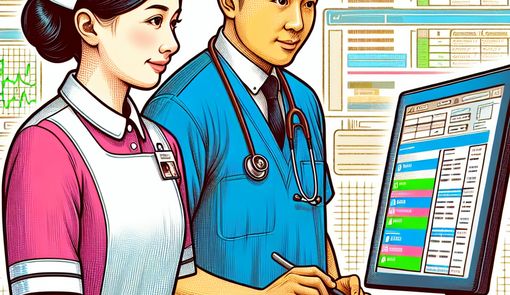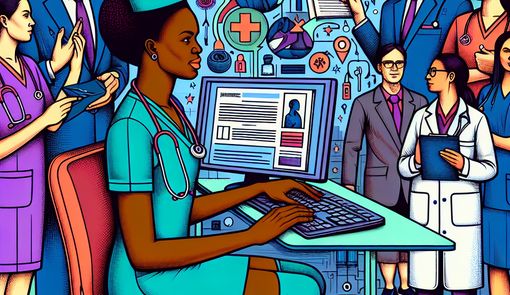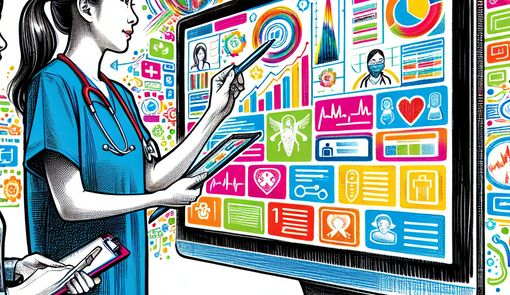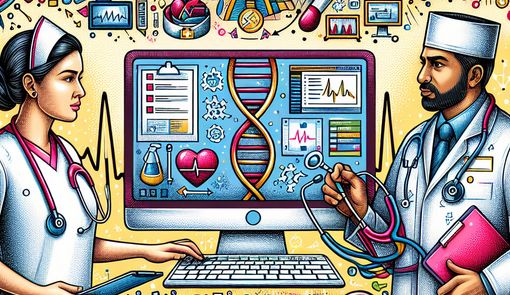The Future of Nursing Informatics: Trends and Predictions for the Field
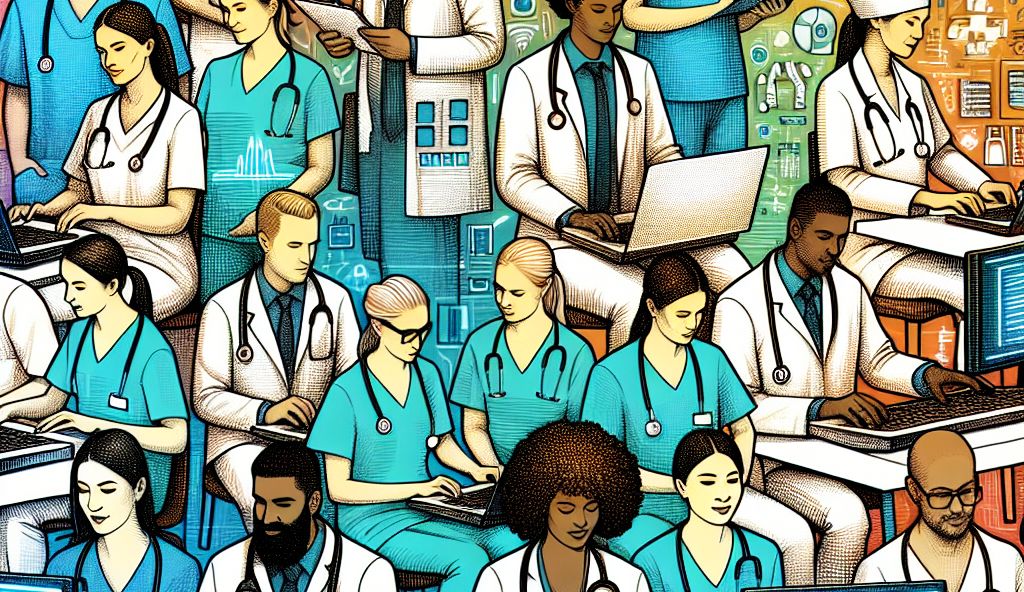
The intersection of healthcare, information technology, and patient care is innovatively woven together in the field of Nursing Informatics (NI). This specialization is at the forefront of transforming healthcare through technology, making significant strides in improving patient outcomes, streamlining processes, and increasing the efficiency of healthcare staff. As we delve into the future of Nursing Informatics, several trends and predictions come to light, outlining a path that is as challenging as it is exciting.
Emerging Trends in Nursing Informatics
Integration of Big Data and Analytics: Big data analytics is becoming crucial in NI, enabling nurses to identify patterns and insights that can drive improvements in care delivery. The integration of electronic health records (EHRs), health information exchanges (HIEs), and other data sources provides valuable information that can inform clinical decision-making and health policy.
Advancements in Artificial Intelligence (AI) and Machine Learning (ML): AI and ML are significantly impacting NI by automating routine tasks, predicting patient outcomes, and personalizing care. These technologies are being used to develop predictive analytics tools that can alert nurses to patients at risk of complications, medication errors, or other adverse events.
Telehealth and Remote Monitoring: The rise of telehealth has expanded the role of informatics nurses outside the conventional hospital setting. Remote patient monitoring tools and telehealth platforms enable nurses to provide care and consultation remotely, which is especially important in rural or underserved areas.
Cybersecurity and Data Privacy: As health data becomes increasingly digital, the protection of sensitive patient information is paramount. Nursing informatics professionals are at the frontline of designing and implementing security measures to safeguard health information against breaches and cyber threats.
Emergence of the Informatics Nurse Specialist: The complex nature of healthcare IT has given rise to a new breed of nurse—the informatics nurse specialist (INS). These professionals blend clinical expertise with IT skills to help bridge the gap between patient care and technology.
Predictions for the Future of Nursing Informatics
Expansion of Roles and Responsibilities: NI professionals will likely take on broader roles within healthcare organizations. In addition to managing and analyzing data, these nurses may become integral in strategic planning, policymaking, and implementing informatics solutions.
Enhanced Education and Certification Requirements: As the field matures, education and certification requirements for informatics nurses are expected to become more rigorous. Advanced degrees and specialized training programs may become the norm, equipping nurses with the skills needed to manage complex information systems.
Greater Collaboration with Interdisciplinary Teams: Nursing informatics is poised to take center stage in collaborative patient care. Informatics nurses will work more closely with physicians, pharmacists, and other healthcare professionals to ensure seamless communication and coordinated care, enabled by integrated technology solutions.
Innovative Health Informatics Tools: New tools and technologies are being developed to support the intricacies of NI. These might include sophisticated EHRs with predictive capabilities, mobile health applications tailored to nurse workflows, and advanced decision-support systems.
Increased Focus on Patient-Centric Care The ultimate goal of NI is to improve patient care. As such, we can anticipate a continued emphasis on patient engagement and participation in their own health management. This could involve the use of patient portals, wearables, and other technologies that encourage active patient involvement.
Challenges and How to Address Them
Addressing the Digital Divide: As technology becomes embedded in healthcare, the risk of a digital divide—disparities in access to digital resources—increases. Strategies to improve digital literacy and access will be critical in ensuring that all populations can benefit from advancements in NI.
Ensuring Interoperability: The ability for different systems and devices to communicate and exchange data is a perpetual challenge in healthcare IT. Efforts to develop standards and protocols for interoperability will be central to the success of NI initiatives.
Managing Change and Promoting Adoption: Implementing new technologies and processes requires change management. Nurses and other healthcare professionals need support and training to adapt to new systems and embrace their potential.
Ethical Considerations: The use of AI and data analytics raises ethical questions about privacy, consent, and bias. Developing guidelines and ethical frameworks will be essential in navigating these complex issues.
Financial Investment: Developing, deploying, and maintaining informatics solutions requires significant financial resources. Investment in education, technology, and infrastructure will be necessary to reap the benefits of NI.
Conclusion
The future of Nursing Informatics is vibrant with opportunities and challenges. The evolving landscape requires that informatics nurses are continually learning and adapting to new technologies, thinking critically about the implications of data-driven healthcare, and advocating for the best patient outcomes. By staying informed and proactive, Nursing Informatics will continue to play a pivotal role in shaping the future of healthcare.
Frequently Asked Questions
What is Nursing Informatics?
Nursing Informatics (NI) is a specialized field that integrates nursing science, information science, and computer science to manage and communicate data, information, knowledge, and wisdom in nursing practice.
What are the key trends driving Nursing Informatics?
Key trends in Nursing Informatics include the integration of Big Data and Analytics, advancements in Artificial Intelligence and Machine Learning, the rise of Telehealth and Remote Monitoring, a focus on Cybersecurity and Data Privacy, and the emergence of the Informatics Nurse Specialist.
What are the responsibilities of an Informatics Nurse Specialist (INS)?
The Informatics Nurse Specialist (INS) combines clinical expertise with IT skills to optimize the use of technology in healthcare. They are responsible for designing, implementing, and evaluating health information systems to improve patient care and outcomes.
How can nurses advance their careers in Nursing Informatics?
Nurses looking to advance their careers in Nursing Informatics can pursue advanced degrees in informatics, gain specialized training in healthcare IT systems, obtain relevant certifications such as the Certified Informatics Nursing (CNIO), and actively participate in professional development opportunities.
What are the ethical considerations in Nursing Informatics?
Ethical considerations in Nursing Informatics revolve around patient data privacy, informed consent, data security, and addressing biases in AI algorithms. Nurses in this field must adhere to ethical standards and guidelines to safeguard patient confidentiality and trust.
How does Nursing Informatics contribute to patient care?
Nursing Informatics plays a crucial role in enhancing patient care by improving the efficiency of healthcare delivery, reducing medical errors, promoting evidence-based practice, and empowering patients to actively participate in their health management through the use of technology tools.
How can healthcare organizations support the adoption of Nursing Informatics?
Healthcare organizations can support the adoption of Nursing Informatics by investing in robust IT infrastructure, providing ongoing training and support for staff, fostering a culture of innovation and continuous improvement, and prioritizing data security and privacy measures.
What are the future prospects for Nursing Informatics professionals?
The future prospects for Nursing Informatics professionals are promising, with opportunities for expanded roles, greater collaboration with interdisciplinary teams, innovative tools and technologies, and a focus on patient-centric care. Continuous professional development and staying abreast of technological advancements will be key for success in the field.
Further Resources
For readers interested in exploring more about the future of Nursing Informatics and related topics, the following resources provide valuable insights and information:
- American Medical Informatics Association (AMIA): The AMIA offers a wealth of resources, including webinars, white papers, and research articles on nursing informatics and healthcare technology advancements. Visit AMIA for more information.
- Healthcare Information and Management Systems Society (HIMSS): HIMSS is a global organization focused on improving health through information and technology. Their website, HIMSS, offers educational resources, events, and publications related to nursing informatics.
- Journal of Nursing Informatics: Explore the latest research and developments in nursing informatics through the Journal of Nursing Informatics. Access articles and publications at Journal of Nursing Informatics.
- HealthIT.gov: Managed by the U.S. Department of Health and Human Services, HealthIT.gov provides resources on health information technology, including nursing informatics. Visit HealthIT.gov for insights and updates.
- International Medical Informatics Association (IMIA): IMIA is a global organization that aims to advance health informatics worldwide. Explore resources, events, and publications related to nursing informatics on IMIA.
- NurseLeader.com: This platform offers articles, webinars, and resources specifically tailored for nurse leaders, including those in the informatics field. Visit NurseLeader for industry insights and networking opportunities.
- LinkedIn Groups: Joining LinkedIn groups focused on nursing informatics can provide networking opportunities, discussions, and access to industry professionals. Search for groups such as

